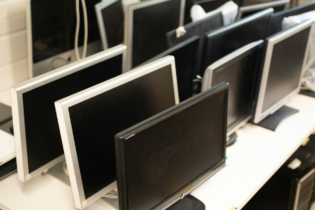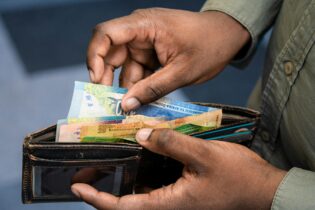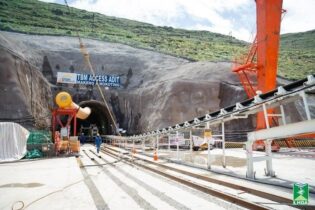by Gareth Burley, The Southern African Association for Energy Efficiency
For most South Africans, recycling waste is now a part of our everyday lives – knowing that we are playing our part to conserve our natural resources and leave a legacy for generations to come. But many are not aware that this goes beyond conservation and onto a notoriously difficult subject for South Africa and most communities: conserving space in our landfills. Landfill sites are growing at a rapid rate and waste has direct and indirect impacts on human and ecosystem health, including contamination of surface and ground waters. In addition, methane emissions from waste contribute an estimated 2% of the greenhouse gas emissions profile of South Africa. These impacts could be significantly reduced with improved waste management practices. In Port Elizabeth, the Nelson Mandela Bay Municipality (NMBM) decided to launch a campaign in 2008 to stop waste to landfill by asking residents to not dump waste but rather exchange it to save the environment. It was called the NMB Waste Exchange (WX), and is one of the waste reduction projects of the Integrated Waste Management Plan. It is a free web-based system that enables generators and users of waste material to exchange waste material at no cost to them, thereby reducing waste to landfill. Once a user is registered on the system, they can either post a listing or advert for wanted waste material or search on the listings of unwanted waste material posted by other users. Waste material can be anything that can still be used by someone else such as cardboard boxes, left over building material, recyclables, wood, obsolete furniture or building rubble, to name a few. By making use of the WX, users can benefit by saving on transport, disposal and storage costs. It may also assist in giving your company a competitive edge in the sustainable usage of natural resources and assist in locating alternative material suppliers that offer input material for your business, at a competitive price, thereby lowering your raw material or input costs. By signing up and taking part, residents help the Nelson Mandela Bay reduce the carbon footprint while improving their business environmental and social responsibility image. Although waste exchanges are well-known in other countries such as New Zealand, Europe and America, it is a new concept in South Africa, with WX being the second in South Africa. The other is in the City of Cape Town and is referred to as IWEX (Integrated Waste Exchange).Various challenges have been identified in the development and running of the project. Intensive marketing is necessary to expose this unknown concept to key stakeholders in business and industry, which can become an expensive and tedious process. It is also difficult to gage the success of the project, as it can only be done through users reporting successful exchanges. Limited access to computers and the internet may also exclude certain people from participating and the lack of involvement from local and provincial government can be a problem as they do not participate and promote the system.
Complementing the work done by the NMBM are the entrepreneurs who have started business around waste and recycling. The Waste Trade Company (WTC) was established in the NMBM by Howard Bulkin, a man who saw the opportunity to transform other peoples waste into opportunities and revenue. His love of nature and passion to make a difference was the driving force behind building a company that would not only benefit him, but would also be the vehicle to transform and develop the lives of his employees. Bulkin and his team continue to successfully grow and develop the WTC, which now has 102 permanent employees and 43 casual staff members. WTC strives to act responsibly in preserving our natural resources and ensuring a cost-efficient, safe and quality service by exploring innovative opportunities. Now globally recognised for its recycling, waste management and transport industry, the WTC continues to create sustainable wealth for all stakeholders. At the heart of the WTC is the schools programme, which empowers kids with the knowledge and principles of recycling. It was initiated as part of the company’s social responsibility campaign and has since signed up 145 schools in the NMBM. Understanding the nature of children, the project was built on the following principle: Tell me and I’ll forget, show me and I may not remember, involve me and I’ll understand. Children are encouraged to bring recyclable materials from home, which they get to distribute in the waste separation area after attending the theoretical info session. This fun activity involves the participation of the children and aids their understanding and learning experience. The participating schools benefit from the free collection of recyclable materials and the rebate received from WTC for the recyclables. The funds are usually put towards buying sporting equipment, upgrades or even creating soup kitchens in the underprivileged communities. “This initiative has been a huge success and we are also facilitating educational field trips to our depot. The children can now have a first-hand experience of the magnitude of waste processed per day and see how it is being separated. Businesses and industries in the NMB Metro now have the opportunity to donate their waste to schools,” says Bulkin. Both WX and the WTC are promoting a culture of recycling and entrepreneurship through their reliable cost-efficient services, empowering both business and the youth through educational initiatives. “99% of what goes to landfill can be used in a business model. Upcycling and recycling of waste can start new businesses and create jobs, as seen by the WTC. Business transformed by this mindset can truly serve nature and play an essential role in moving South Africa forward towards manageable waste,” says Andrew Phillips, co-founder of Green Leaf Sustainability Services.




